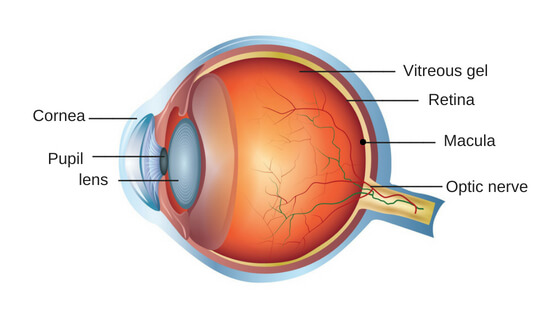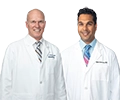
Last Updated on June 27, 2025 by Aaron Barriga
What is Age-Related Macular Degeneration (AMD)?
Age-related Macular Degeneration is a widespread eye condition that causes vision loss among people who are 50 years and above. If you’re worried that you’re not able to see things straight ahead, a small spot near the center of your retina may have been damaged. The disease may progress differently among different people.
For some, it doesn’t cause a problem for a long time, while for others, they may develop a loss of vision in one or both eyes. It then becomes an obstacle in performing daily activities such as reading, writing, driving, household chores, and seeing faces.
Stages of Age-Related Macular Degeneration (AMD)
1. Early AMD
There exists a medium-sized drusen, approximately the width of a typical human hair. However, people in this stage do not suffer from a loss of vision.
2. Intermediate AMD
Although people will not experience any symptoms, this stage may result in loss of vision. Here, the drusen is larger, and some discoloration would appear in the retina. However, these changes can only be identified after an eye exam.
3. Late AMD
People at this stage will experience a loss of vision. There are two types of late AMD.
- Dry AMD, where communication of the visual information with the brain is weakened, resulting in the loss of vision. Around 80% of people experience Dry AMD, wherein you gradually lose your central vision.
- Wet AMD, where the central part of the retina is swollen and damaged. This can happen pretty quickly and is serious. Although it is less common, it is much more severe. You’re likely to have unusual blood vessels growing under your retina, which results in a discharge of blood and other fluids.
Your chances of losing your vision are higher with Wet AMD than Dry AMD. Moreover, one can experience both Dry and Wet AMD at the same time, and either one can appear first.
Risk Factors of Age-Related Macular Degeneration (AMD)
There are several risk factors involved in the possibility of Age-related Macular Degeneration. Leading an unhealthy lifestyle, which includes smoking, consuming a diet rich in saturated fat that comprises meat, butter and chees,e can lead to cardiovascular disease and being overweight. Besides, continuous exposure to the sun without eye protection can also lead to Age-related Macular Degeneration.
There are also a few factors that are beyond anyone’s control, which involve a person aging, being Caucasian, a family history of AMD, having farsightedness, and if you are a female, can all lead to Age-related Macular Degeneration.
Symptoms of Age-Related Macular Degeneration (AMD)
Symptoms may not appear in the early stages of AMD. You may notice that the quality of your vision would weaken and that straight lines may appear irregular to you. Moreover, dark, cloudy areas or whiteout, as well as your ability to recognize colors, may also be altered.
Treatment of Age-Related Macular Degeneration (AMD)
Eye drops are applied to widen your pupil, which allows the doctor to look into the inside of your eye with the help of a special lens.
Your doctor may also inject a yellow dye into your arm, which travels throughout your blood vessels, and with the help of a special camera, your doctor will be able to check if there is any unusual development of blood vessels under the retina.
Although there is no way to cure Dry AMD at present, nutritional supplements can help slow down the condition. The following vitamins and minerals would help:
- Vitamin C (500 mg)
- Vitamin E (400IU)
- Lutein (10gm)
- Zeaxanthin (2mg)
- Zinc (80mg)
- Copper (2mg)
For patients with Wet AMD, anti-VEGF treatments help to minimize the development of unusual blood vessels in the retina and also control any leaking that may have happened. There are also laser treatments available for people with Wet AMD.
Good eye health is a very significant part of your well-being. If you think you might be at risk of developing AMD and are looking for an experienced ophthalmologist in Fresno, call us at 559-449-5050.

Dr. Azhar I. Salahuddin is an ophthalmologist and is fellowship-trained in cornea, external diseases, and refractive surgery. Dr. Salahuddin has been performing cataract surgery for over 19 years and specializes ocular reconstruction, corneal transplantation surgery as well as vision correction through a variety of intraocular lenses. Dr. Salahuddin is board-certified by the American Board of Ophthalmology and was trained at Boston University.

